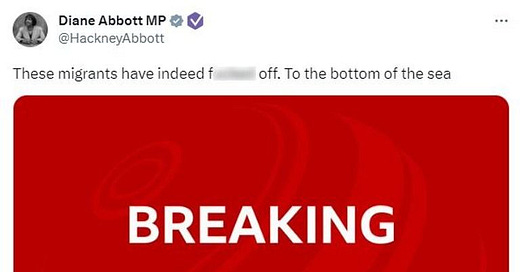Borkowski Weekly Media Trends: Navigating Political Waters, Beyond-Beyond Meat and more
Not So Smooth Sailing to Election Victory
It is an almost universally accepted fact that Labour will win the next general election. Indeed, at a No. 10 reception earlier this week, acting and ex PMs Oliver Dowden and David Cameron made reference to said fact as they reminisced about the halcyon days of a decade ago.
However, the general election is still many months away, leaving a lot of time for things to change. And in the world of politics, one poor move has frequently proved enough to turn the victors into vanquished. Almost too-predictably, it was Dianne Abbott who stepped up to the task of trying to demonstrate this.
In a now deleted tweet, Dianne linked to an article about 41 migrants in a shipwreck off Italy with the caption “these migrants have indeed f***ed off. To the bottom of the sea”.
The former shadow home secretary's comments came off the back of Conservative deputy chairman Lee Anderson's controversial remark to Express.co.uk on Monday evening - that if migrants do not want to be housed on a barge, they should “f*** off back to France”.
Safe to say, just as with Dianne’s comments around anti-semitism that saw her suspended from Labour, this new tweet also didn’t play out quite as she planned.
Within moments, the tweet went viral as commentators criticised her for her blatant political opportunism. Tory MP Brendan Clarke-Smith took center stage stating "We all know that you can't take Labour seriously on immigration or national security, but what a shame they also seek to exploit tragedies like this to push their warped agenda."
Whilst Dianne remains an Independent due to those antisemitic remarks, this new error further questions what role, if any, she’ll have in Keir’s government, given he previously backed her for Home Secretary.
And beyond that, the whole episode serves as a reminder that, even when Labour’s success seems certain, their journey there is unlikely to uneventful!
The Attention Economy: How to Market to Gen Z
In today's attention economy, brands are competing for the limited attention of consumers, and it's down to 1 second now.
A recent study by Omnicom Media Group (OMG), Yahoo, and Amplified Intelligence found that 53% of all ad formats studied met viewability standards but achieved less than 1 second of active attention. This means that most ads are simply being ignored by Gen Z consumers. The first 15 seconds are the most important. 15-second video ads delivered 2.8x more active attention than 30-second videos.
Age is a factor in attention. Older consumers are more likely to pay attention to ads than younger Gen Z consumers. This is likely because they have more disposable income and are more interested in making informed purchases.
Here’s what we know about Gen Z: Gen Z is more diverse than previous generations, more socially conscious and they have less attention to give.
So, how can brands break through the noise and capture the attention of Gen Z?
Create engaging content. Gen Z consumers are constantly bombarded with content, so it's important to create content that is truly engaging. This means creating content that is visually appealing, relevant to their interests, and shareable.
Use short-form content. Gen Z consumers have notoriously short attention spans, so it's important to use short-form content like videos, GIFs and Augmented Reality.
Be authentic. Gen Z consumers are savvy and can spot a fake from a mile away. So, it's important to be authentic in your marketing efforts. This means being genuine and transparent with your audience.
Partner with influencers. Gen Z consumers are more likely to trust recommendations from influencers than from brands themselves.
Every second counts. We all know that attention is key to brand growth but now we know attention can be limited to just 1 second. If consumers don't pay attention, they won't remember the brand. If they don’t remember the brand, there’s no brand recognition and customer-brand relationship.
Beyond Meat: From Sizzle to Drizzle
News that vegan burger powerhouse Beyond Meat’s sales have fallen by one third demonstrates how drastically brands can be affected by major societal issues and the need to be able to demonstrate both value and necessity in any circumstances.
The cost of living crisis has driven people to opt for cheaper animal meat in what appears to be a drastic shift in attitudes. During its meteoric rise Beyond Meat became a mainstay, but its failure to establish itself (and justify its higher price tag) as a genuine culinary, moral, dietary and environnemental necessity has seen it repositioned in the eyes of consumers as a first-world luxury.
There are parallels with other fashionable brands. In lockdown droves of people found themselves willing and able to justify Peleton’s exorbitant prices, but again the fitness brand - whether through hubris or valiant failure- did not persuade people that its value was the same in a post-COVID world.
In a world where massive tectonic shifts are imposed on society every day it’s a harsh lesson that a brand built only for the status quo will be unlikely to sustain its peak success.




